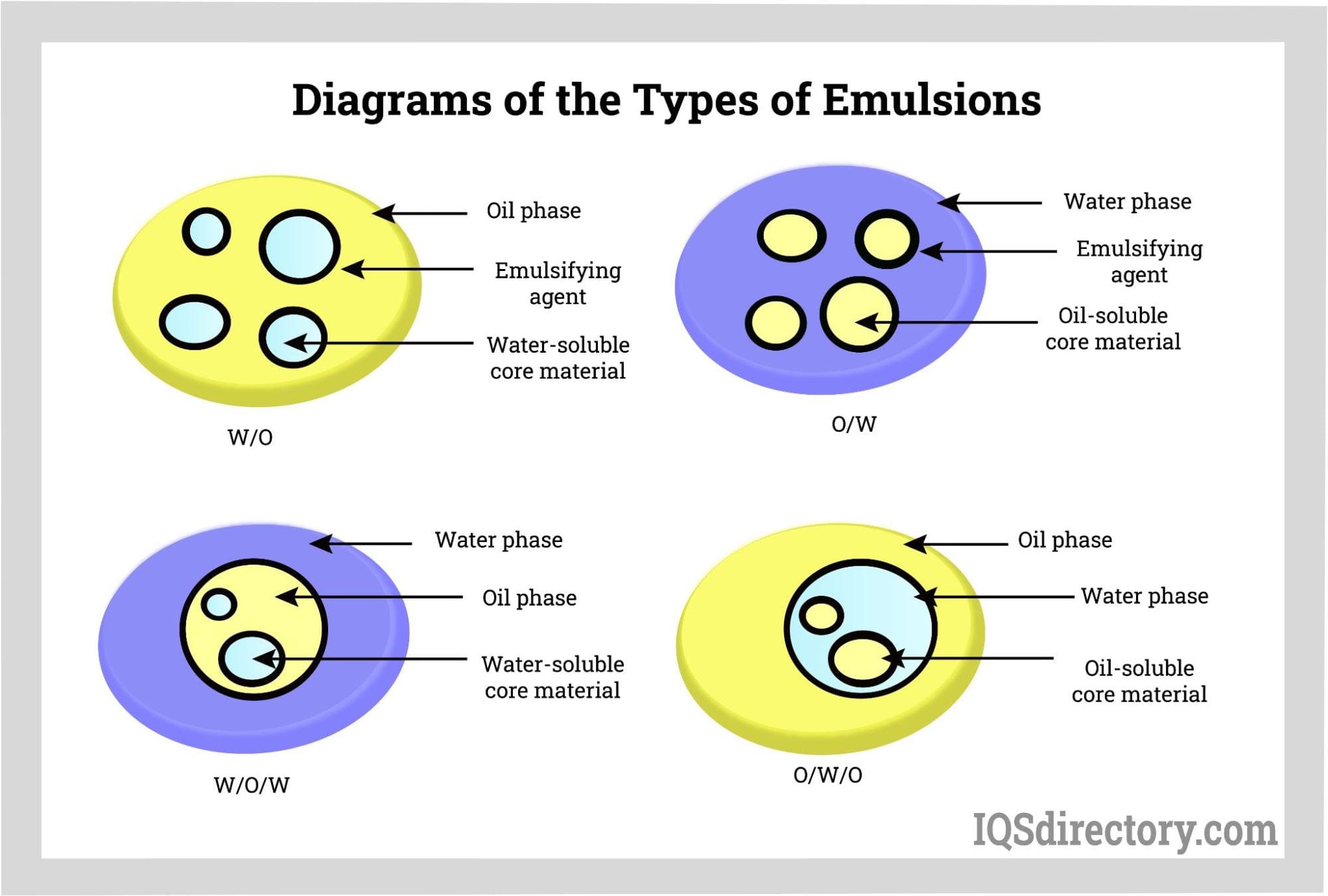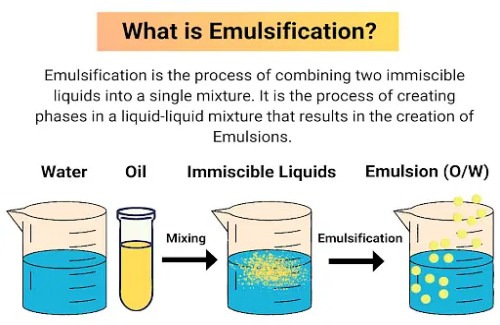How to Choose the Right Emulsifiers for Your Cosmetic Formulation
How to Choose the Right Emulsifiers for Your Cosmetic Formulation
Blog Article
The Science Behind Emulsifiers and Their Significance in Modern Manufacturing
Emulsifiers play an important role in modern-day production, acting as the unhonored heroes that blend oil and water for a wide array of products. As customer preferences change in the direction of cleaner tags, the demand for cutting-edge emulsifiers is growing.
What Are Emulsifiers?
Emulsifiers are important representatives on the planet of food and product production, functioning as the adhesive that binds 2 or else immiscible liquids, like oil and water. You could not recognize it, yet these compounds play a vital role in developing stable combinations. They decrease the surface area tension between these liquids, permitting them to mix seamlessly. Common examples consist of lecithin discovered in egg yolks and soybeans, and mono- and diglycerides used in different refined foods.

When you whip up a salad dressing or indulge in a velvety treat, emulsifiers help preserve that perfect texture. Without emulsifiers, many foods would separate, leading to unwanted textures and flavors.
The Chemistry of Emulsification
When you blend oil and water, you may observe they don't mix conveniently; that's where the chemistry of emulsification comes into play. To overcome this difficulty, emulsifiers are utilized.
These particles have a hydrophilic (water-attracting) head and a hydrophobic (water-repelling) tail. When you add an emulsifier, its particles position themselves at the oil-water user interface, lowering surface tension and enabling the beads to blend. The emulsifier develops a safety layer around each droplet, stopping them from coalescing back into different layers. Recognizing this chemistry is crucial for achieving security in products like dressings, lotions, and sauces, making emulsification vital in modern production.
Types of Emulsifiers
Numerous types of emulsifiers play important duties in supporting combinations of oil and water. You'll commonly encounter 2 main groups: natural and artificial emulsifiers. All-natural emulsifiers, like lecithin from egg yolks or soy, are stemmed from plants and pets, making them popular in food. They're usually taken into consideration much safer and healthier alternatives.
On the other hand, artificial emulsifiers, such as mono- and diglycerides, are chemically engineered to improve security and rack life. They're commonly utilized in refined foods and aesthetic items.
Furthermore, you may find non-ionic, anionic, and cationic emulsifiers, each with one-of-a-kind buildings that influence their efficiency. Non-ionic emulsifiers, as an example, work well in a wide variety of pH levels, while anionic emulsifiers have a tendency to execute better in alkaline problems. Recognizing these types can help you choose the ideal emulsifier for your certain application.
Systems of Emulsion Formation
Recognizing how solutions create is vital for producing secure blends of oil and water. Emulsions happen when you disperse small droplets of one liquid into an additional immiscible liquid, such as oil in water. This process requires power, usually provided through agitation or mixing. When you present an emulsifier, it lowers the surface area tension between the 2 liquids, allowing them to mix more quickly.
The emulsifier particles have a hydrophilic (water-attracting) head and a hydrophobic (oil-attracting) tail. When you include an emulsifier, these molecules arrange themselves at the oil-water user interface. The hydrophilic heads engage with water, while the hydrophobic tails secure right into the oil. This develops an obstacle that supports the droplets, stopping them from coalescing.
Applications of Emulsifiers in Various Industries
Emulsifiers play an essential function across different sectors, making your preferred foods smoother and much more delightful. In cosmetics, they improve item structure and security, making certain a pleasurable application experience. Plus, in drugs, they help provide essential active ingredients properly, enhancing total effectiveness.
Food Sector Uses
While you may not recognize it, emulsifiers play a vital function in the food sector, enhancing the texture, stability, and rack life of many items. In baked goods, emulsifiers improve dough handling and retain moisture, resulting in a better texture and extended freshness. By guaranteeing uniformity and quality, emulsifiers are significant to supplying the scrumptious products you enjoy every day, making them an important component in contemporary food manufacturing.
Aesthetic Solutions Benefits
When it comes to cosmetic solutions, emulsifiers are important for developing products that really feel elegant and execute efficiently. You'll notice that emulsifiers improve item stability, stopping splitting up and extending rack life. Generally, emulsifiers play an important function in supplying top quality cosmetic products that fulfill your beauty demands.
Pharmaceutical Applications Review
In the pharmaceutical sector, emulsifiers are essential for formulating effective medicines. You'll locate emulsifiers in different dose forms, like lotions, ointments, and liquid suspensions, enhancing the bioavailability of medications.
The Effect of Emulsifiers on Item Top Quality

By making certain stable emulsions, you reduce the risk of spoilage and extend life span, eventually conserving you money and time. You'll additionally locate that emulsifiers can improve the bioavailability of active components in your products, making them much more efficient for consumers.
Additionally, they enable you to produce ingenious formulas that satisfy diverse consumer needs. Whether you're crafting a luscious dressing or an elegant lotion, emulsifiers are essential for achieving the wanted outcomes. Basically, by recognizing and leveraging the influence of emulsifiers, you can substantially boost the top quality of your products.
Future Trends in Emulsifier Development
As the need for cleaner labels and sustainable items increases, the growth of new emulsifiers is readied to advance significantly. You'll discover a shift in the direction of plant-based and natural emulsifiers, driven by consumer choices for components that are environmentally pleasant and much less processed. Technologies in biotechnology will likely improve the functionality and efficiency of these emulsifiers, permitting makers to produce secure solutions with less additives.
You might likewise see a boost in multifunctional emulsifiers that not only maintain emulsions but also boost taste, structure, or dietary value. This pattern might simplify component checklists while improving item performance.
Furthermore, with breakthroughs in nanotechnology, emulsifiers could be crafted at the molecular level to accomplish extraordinary stability and efficiency. Emulsifiers. As you explore these patterns, you'll find that the future of emulsifier growth is not just about functionality, yet additionally about embracing sustainability and transparency in components
Often Asked Questions
Are Emulsifiers Safe for Usage in Food Products?
Yes, emulsifiers are normally risk-free for intake in food. They've been extensively examined and accepted by food security authorities, so you can appreciate your favorite foods without stressing about their impact on your health.
Can Emulsifiers Be Derived From All-natural Resources?
Yes, you can derive emulsifiers from natural resources. Active ingredients like lecithin from egg yolks or soybeans and casein from milk prevail. These natural emulsifiers assist support combinations without synthetic additives, making them prominent in different items.

How Do Emulsifiers Influence Life Span of Products?
Emulsifiers maintain mixtures, protecting against separation and wasting - Emulsifiers. By maintaining uniformity, they expand products' service life, ensuring freshness and top quality. You'll discover that emulsifiers aid keep your preferred foods and cosmetics executing well over time
What Are Prospective Side Results of Emulsifiers?
You might experience digestion concerns more helpful hints when consuming products with emulsifiers, as they can interrupt digestive tract microorganisms. Some studies suggest possible links to swelling or allergic reactions, but a lot more study Discover More Here is required to fully recognize these effects.

Are There Alternatives to Standard Emulsifiers?
Yes, there are alternatives to standard emulsifiers. You can explore options like all-natural gums, starches, or lecithin. Each different offers special homes, so experiment to locate what works best for your details application.
Report this page